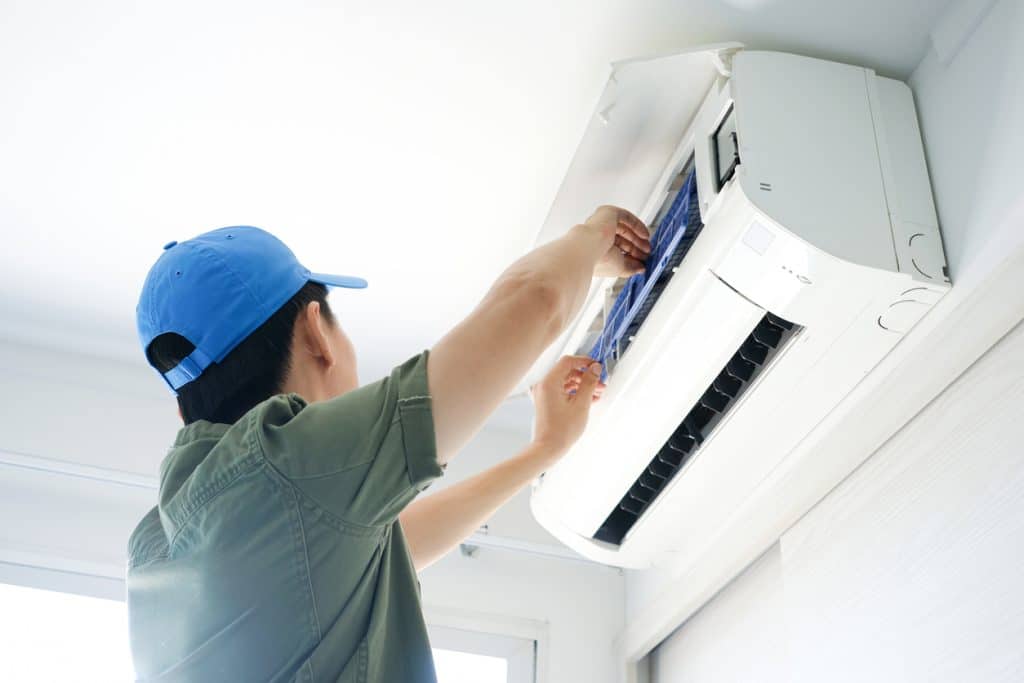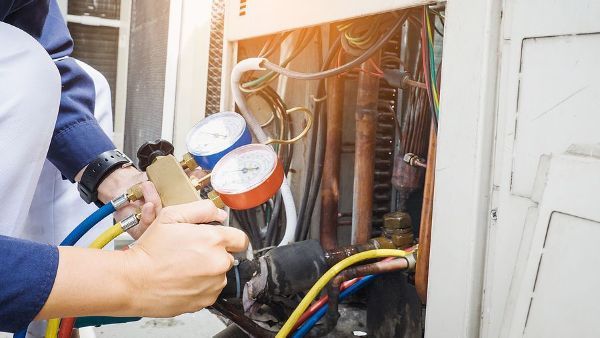Everything about Cooling And Heating: Identifying Common Issues and Effective Air Conditioning Repair Service Techniques
Cooling and heating systems are important for maintaining interior convenience. Comprehending their elements and performance is vital for recognizing common concerns. House owners commonly deal with troubles such as inefficient cooling, weird smells, or increasing power expenses. These indications can suggest underlying problems that may need attention. Checking out DIY troubleshooting strategies can be useful, however knowing when to seek specialist assistance is similarly crucial. What steps can be required to assure resilient performance?
Understanding Your Cooling And Heating System: Components and Performance
A cooling and heating system, often thought about the backbone of indoor climate control, consists of several essential parts that work together to control temperature and air high quality. The key aspects include the home heating unit, air flow system, and a/c system. The heating unit, normally a heating system or central heating boiler, generates warmth during colder months, while the cooling system cools down interior spaces throughout the summer season.

Usual A/c Troubles House Owners Encounter
Homeowners usually face a number of typical heating and cooling problems, including inconsistent temperature level distribution throughout their living rooms. In addition, unusual noises throughout procedure can indicate underlying concerns that require interest. Attending to these worries immediately is necessary for preserving excellent system efficiency.
Irregular Temperature Circulation
Many households experience the irritating concern of inconsistent temperature level circulation, where certain areas feel annoyingly warm while others remain as well cold. This issue usually emerges from a variety of aspects, consisting of inadequate insulation, obstructed vents, or a poorly sized heating and cooling system. When air ducts are not sufficiently sealed or when furnishings obstructs air movement, some rooms may receive inadequate air conditioning. Additionally, thermostat positioning can greatly influence temperature policy; a thermostat situated in a sunlit location might misstate the overall temperature level of the residence. Normal maintenance, including cleansing filters and making sure ductwork is clear, can aid ease these discrepancies. Home owners may also take into consideration zoning systems to much better control temperature levels throughout different locations of the home, promoting a much more comfy living atmosphere.
Unusual Sounds During Procedure
When a HVAC system operates, unusual noises can show underlying problems that call for attention. Home owners might experience a variety of sounds, such as grinding, squealing, or hissing. Grinding noises commonly indicate worn-out bearings or components, while squealing can recommend loosened belts or parts requiring lubrication. Hissing might suggest a cooling agent leak, which can compromise the system's performance. In addition, banging noises might point to loosened ductwork or a problem with the blower fan. Each of these noises functions as a warning, prompting property owners to examine additionally. Overlooking these indicators can bring about even more considerable problems and pricey fixings. Routine upkeep and timely attention to uncommon noises can boost system durability and performance, making certain a comfortable living setting.
Indications That Indicate Your Air Conditioning Needs Fixing
Exactly how can one inform if their a/c device requires repair? Numerous signs might indicate underlying problems requiring expert focus. If the Air conditioning falls short to cool the area properly, it may recommend a refrigerant leakage or compressor malfunction. Furthermore, a rise in power bills without corresponding use adjustments can signal ineffectiveness in the system. Homeowners ought to likewise look out to unusual smells originating from the device, which could indicate mold development or electrical problems. If the Air conditioning often cycles on and off, it may be an indicator of a damaged thermostat or other mechanical problems. The visibility of water merging around the device can show a clogged drain line. Recognizing these signs early can save money and time, guaranteeing that the a/c system runs successfully and effectively.
DIY Troubleshooting Techniques for HVAC Issues
When facing a/c issues, property owners can utilize a number of DIY troubleshooting techniques to recognize the trouble. Trick approaches include checking thermostat setups, inspecting air filters, and reviewing water drainage problems. These steps can help determine usual breakdowns prior to seeking professional assistance.
Checking Thermostat Setups
What steps should property owners take to assure their thermostat settings are proper? They need to confirm the thermostat is set to the preferred temperature and mode, whether home heating or cooling. Examining for a clear screen and confirming the thermostat is not established to "hold" or "holiday" setting is crucial. House owners must likewise validate that the thermostat is degree and mounted in a place complimentary from drafts, direct sunshine, or other temperature level influences. In addition, altering the thermostat can help give accurate analyses. If the thermostat operates batteries, changing them may settle any type of concerns. By systematically assessing these elements, home owners can typically recognize and rectify thermostat-related troubles, promoting suitable heating and cooling system efficiency.
Inspecting Air Filters
Air filters play a vital duty in maintaining optimal cooling and heating performance. They catch dirt, irritants, and other bits, making certain clean air circulation. Gradually, filters can come to be clogged, decreasing air movement and effectiveness. To inspect air filters, people need to initially locate the filter, typically discovered in the return duct or near the heater. As soon as located, they need to evaluate the filter's condition-- if it appears filthy or tarnished, it most likely demands substitute. The majority of filters call for altering every 1-3 months, relying my review here on use and ecological variables. Normal examination and prompt substitute of air filters not just boost air top quality yet additionally prolong why not try this out the life-span of a/c systems, stopping prospective malfunctions and pricey repairs.
Evaluating Drain Issues
Just how can homeowners properly identify and deal with drain problems within their a/c systems? They should examine the condensate drain line for clogs or blockages, which can lead to water accumulation. Property owners might use a wet/dry vacuum cleaner to remove any kind of debris blocking the line. Next off, checking the drain frying pan for corrosion or leakages is crucial, as a damaged frying pan can cause water to overflow. Regular cleaning of the drain line with a combination of vinegar and water helps avoid future blockages. Furthermore, ensuring appropriate incline of the drainpipe line advertises reliable water flow. If these do it yourself techniques do not solve the problem, seeking advice from an expert a/c technician may be essential to stay clear of prospective water damage and system failure.
When to Call a Specialist for Air Conditioner Fixings

While some air conditioning concerns can be taken care of with DIY methods, there are situations where calling a specialist becomes necessary. Home owners need to seek skilled support when they run into relentless troubles, such as poor cooling, strange sounds, or uncommon smells emanating from the system. These signs and symptoms may indicate deeper issues that need specialized understanding and devices to detect and repair appropriately.

Preventative Upkeep Tips for Cooling And Heating Longevity
Normal preventative upkeep can significantly improve the long life of HVAC systems. Property owners need to set up annual assessments by qualified technicians to evaluate system performance and recognize potential issues. On a regular basis transforming or cleansing air filters is important, as this assurances correct airflow and reduces i was reading this strain on the system. Furthermore, inspecting and sealing ductwork stops power loss and enhances general efficiency.
It is likewise suggested to maintain the outside unit free from debris and plant life, permitting peak air movement and warm exchange. Home owners ought to examine the condensate drain for obstructions to prevent water damage and mold growth. Furthermore, maintaining appropriate thermostat settings and making use of programmable alternatives can enhance energy efficiency. Documenting upkeep tasks helps track solution history and can assist in identifying reoccuring problems. By complying with these preventative measures, people can optimize the efficiency and life-span of their a/c systems
Frequently Asked Inquiries
Exactly how Frequently Should I Change My A/c System Filters?
A/c system filters should commonly be replaced each to three months, relying on usage, filter kind, and environmental aspects. Regular substitute helps preserve efficiency and air high quality, ensuring peak system efficiency throughout the year.
What Dimension HVAC System Do I Need for My Home?
To identify the ideal HVAC system size for a home, one should think about square video, insulation top quality, and local climate. Consulting a professional can assist ensure optimal effectiveness and comfort for the details living room.
Exist Eco-Friendly Cooling And Heating Options Available?
Yes, eco-friendly a/c alternatives are readily available, consisting of energy-efficient heatpump, solar-powered systems, and geothermal home heating. These choices reduce power intake and ecological influence, advertising sustainability while keeping reliable environment control for property and industrial areas.
Exactly How Can I Enhance My a/c System's Energy Effectiveness?
To improve HVAC power performance, one can regularly keep the system, seal air leakages, set up programmable thermostats, use energy-efficient filters, and guarantee adequate insulation throughout the home to reduce power usage and enhance performance.

What Is the Typical Life-span of a Heating And Cooling System?
The ordinary lifespan of a cooling and heating system usually varies from 15 to 25 years, depending on elements such as upkeep, use, and the quality of installation. Routine maintenance can greatly extend its operational durability.
Verdict
In summary, a complete understanding of cooling and heating systems empowers property owners to determine usual concerns and address small problems effectively. Acknowledging indications of malfunction, utilizing DIY fixing strategies, and focusing on normal upkeep can boost system efficiency and performance. However, when confronted with complex repair work, employing expert assistance is crucial to guarantee safety and longevity. By fostering awareness and aggressive treatment, people can take pleasure in a comfortable indoor environment while minimizing unanticipated prices related to a/c failures.